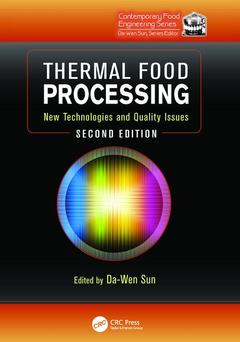Thermal Food Processing (2nd Ed.) New Technologies and Quality Issues, Second Edition Contemporary Food Engineering Series
Coordonnateur : Sun Da-Wen

Thermal processing remains one of the most important processes in the food industry. Now in its second edition, Thermal Food Processing: New Technologies and Quality Issues continues to explore the latest developments in the field. Assembling the work of a worldwide panel of experts, this volume highlights topics vital to the food industry today and pinpoints the trends in future research and development.
Topics discussed include:
- Thermal properties of foods, including heat capacity, conductivity, diffusivity, and density
- Heat and mass transfer and related engineering principles, mechanisms, and models
- The development and application of deterministic heat transfer models for predicting internal product temperatures
- Modeling thermal processing using artificial neural networks (ANN) and computational fluid dynamics (CFD)
- Thermal processing of meat, poultry, fish, and dairy products; canned foods; ready meals; and vegetables
- The effect of ultrahigh temperature (UHT) treatment processing on milk, including the impact on nutrient composition, safety, and organoleptic aspects
- Ohmic, radio frequency (RF) dialectric, infrared, and pressure-assisted heating
- pH-assisted thermal processing
In addition to updating all content, this second edition includes five new chapters: Thermal Effects in Food Microbiology, Modeling Thermal Microbial Inactivation Kinetics, Thermal Processing of Food and Fruit Juices, Aseptic Processing and Packaging, and Microwave Heating. The final chapter of the book examines systems used in the evaluation of thermal processes and the development of time temperature integrators (TTIs) to ensure the safety of thermally processed food. An up-to-date survey of essential techniques and the science behind them, this volume is a critical reference for food industry professionals.
Modeling of Thermal Food Processes. Thermal Physical Properties of Foods. Heat and Mass Transfer in Thermal Food Processing. Thermal Effects in Food Microbiology. Simulating Thermal Food Processes Using Deterministic Models. Modeling Food Thermal Processes Using Artificial Neural Networks. Modeling Thermal Processing Using Computational Fluid Dynamics (CFD). Modeling Thermal Microbial Inactivation Kinetics. Quality and Safety of Thermally Processed Foods. Thermal Processing of Meat and Meat Products. Thermal Processing of Poultry Products. Thermal Processing of Fishery Products. Thermal Processing of Dairy Products. Ultrahigh Temperature Thermal Processing of Milk. Thermal Processing of Canned Foods. Thermal Processing of Ready Meals. Thermal Processing of Vegetables. Thermal Processing of Fruits and Fruit Juices. Innovations in Thermal Food Processes. Aseptic Processing and Packaging. Ohmic Heating for Food Processing. Radio Frequency Dielectric Heating. Infrared Heating. Microwave Heating. Combination Treatment of Pressure and Mild Heating. pH-Assisted Thermal Processing. Time–Temperature Integrators for Thermal Process Evaluation. Index.
Professor Da-Wen Sun is a world authority in food engineering research and education. He is a Member of Royal Irish Academy—the highest academic honor in Ireland, and is also a member of Academia Europaea (The Academy of Europe). His main research activities include cooling, drying, and refrigeration processes and systems; quality and safety of food products; bioprocess simulation and optimization; and computer vision technology. His many scholarly works have become standard reference materials for researchers in the areas of computer vision, computational fluid dynamics modelling, vacuum cooling, and other areas.
Date de parution : 11-2016
17.8x25.4 cm
Date de parution : 05-2012
Ouvrage de 696 p.
17.8x25.4 cm
Thèmes de Thermal Food Processing :
Mots-clés :
Moisture Content; Ohmic Heating; Modeling of Thermal Food Processes; Thermal Process; Quality and Safety of Thermally Processed Foods; Retort Temperature; Innovations in Thermal Food Processes; Log10 CFU; Thermal Physical Properties of Foods; UHT Milk; Aseptic Processing and Packaging; Dielectric Loss Factor; Aseptic Processing; Microbial Inactivation; Dielectric Properties; Stearothermophilus Spores; Dielectric Constant; Decimal Reduction Time; TTIs; Heat Exchanger; Raw Milk; UHT Treatment; UHT Process; Microwave Heating; Bacterial Spores; RF Dielectric Heating; Heat Resistance; Aseptic Packaging; Pasteurized Milk; Ann Model



